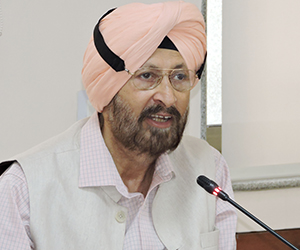New Crisis: Barbarians on the March
After having overrun Mosul and Tikrit in June 2014, the virulently radical Sunni militants of the new "caliphate" headed by Abu Bakr al-Baghdadi, the so-called Islamic State, appear to be gradually closing in on Baghdad. The ISIS militia, numbering between 20,000 and 30,000, have seized key border crossings with Syria and Jordan and now control a large area straddling the Syria-Iraq border. After capturing Faluja in January 2014, ISIS fighters made rapid progress in advancing along the Euphrates River in Anbar province of Iraq. And, forces of the Kurdistan Regional Government (KRG) that had captured oil-rich Kirkuk, regarded as the Kurd capital, have been fighting the ISIS for over a month in the Syrian border town of Kobani.
After vacillating for several months and admitting that he had no strategy, President Obama decided to join the fightagainst ISIS by launching air strikes against the militia. The United States has been joined in this endeavour by Australia, Britain, Canada and France and five Arab countries (Bahrain, Jordan, Saudi Arabia, Qatar and the United Arab Emirates). So far the air strikes have been only partially effective in military terms, but have succeeded in buying time for the disorganised Iraqi forces to regroup to offer a more cohesive fight. Between 500,000 to one million refugees have been added to the large number of displaced persons already struggling to stay alive in the steaming hot cauldron that is West Asia today.
The newly proclaimed Islamic State, not recognised by any other state as yet, is also called ISIS (the Islamic State in Iraq and Syria); ISIL (the Islamic State in Iraq and al-Sham or Islamic State in Iraq and the Levant); and, Daesh. Its leadership’s ideology. Is so primitive and barbaric that Osama bin Laden is reported to have declined to have anything to do with them when they had approached him. The video-taped beheading of three innocent hostages has exemplified its brutality. Al-Baghdadi has openly proclaimed the intention of ISIS to expand eastwards to establish the Islamic state of Khorasan that will include Afghanistan, the Central Asian Republics, eastern Iran and Pakistan. The final battle, Ghazwa-e-Hind – a term from Islamic mythology – will be fought to extend the caliphate to India. An ISIS branch has already been established in the Indian Sub-continent. It is led by Muhsin al Fadhli and is based somewhere in Pakistan.Some factions of the TTP have already declared their allegiance to al-Baghdadi. Afghanistan's new National Security Adviser, Mohammad Hanif Atmar, has said that the presence of Daesh or the ISIS is growing and that the group poses a threat to Afghan security. And, some ISIS flags have appeared in Srinagar.
Weak Counter Strategy
By all accounts, the ISIS militia is slowly but surely gaining ground. It has proved itself adept at fighting simultaneously on multiple fronts. Not surprisingly, the ISIS has carried the war into cyberspace and is deftly exploiting the Internet as an effective propaganda tool to spread its message. It is using Facebook and bulletin boards to influence the minds of Muslim youth and gain recruits. The international community has not yet found an answer to this potent threat.
The triumphant forward march of ISIS has taken place despite the air strikes being launched by the United States and its allies and the help provided to the Shia-dominated government of Iraq by Iran and Russia. The ISIS has absorbed the air strikes well so far, much like the Vietnamese did half a century ago. A major lesson that has emerged from the recent conflicts, particularly those in Afghanistan and Iraq, is that a guerrilla force that operates from safe havens among the rural population cannot be defeated from the air alone. The US and its allies are unlikely to prevail over the ISIS militia without committing troops on the ground to fight a long-drawn counter-insurgency war against them. Alternatively, the US can prime the Iraqi forces to fight ISIS. This would be a better option.
The ISIS militia faces no serious opposition on the ground except from the Kurdish peshmerga.The Kurds are unlikely to be willing to fight beyond the land for which they seek autonomy. The Obama administration is banking on hope and the passage of time to prevail over the ISIS militia. The President is hopeful that in due course the air campaign will begin to become effective, the Iraqi forces will become a more cohesive fighting force, and the Kurds will exert meaningful pressure on the ISIS militia from the north.The probability of any of this happening is low.
The US has been arming the Syrian opposition led by the Free Syrian Army for several years to fight President Assad. It now hopes the Syrian opposition will join the fight against ISIS.The US President is aware that American troops are not welcome in Iraq and even less so in Syria, besides the lack of support at home for involvement in yet another unwinnable war in West Asia. A pragmatic move would be to support the rise of a militarily strong Kurdistan as a bulwark against further ISIS expansion, but Turkey will have to be convinced that such a course of action is necessary. Jordan needs to be given the support necessary to thwart the growth of ISIS to the west.
US officials have been dropping broad hints to the effect that India should join the US and its allies in fighting ISIS as it poses a long-term threat to India as well. India has a large diaspora in West Asia, which includes female workers. Some Indian nurses had been taken hostage by ISIS fighters, but were released unharmed. India also has a large Muslim population that has remained detached from the ultra-radical ISIS and its aims and objectives, except for a handful of misguided youth who are reported to have signed up to fight. This may change if India joins the US-led coalition to fight ISIS. However, India should cooperate closely by way of sharing information and intelligence.
Implications for India
Instability and superpower rivalry in West Asia does not augur well for India’s security and commercial interests. Combined with the escalation of force levels in the Indian Ocean, the heightened tensions in West Asia may ultimately lead to a spill-over of the conflicts to adjacent areas. India now imports almost 75 per cent of the oil required to fuel its growing economy and most of it comes from the Gulf. The long-drawn conflicts of the last two decades of the 20th century had forced India to buy oil at far greater cost from distant markets, with no assurance of guaranteed supplies. The 1991 oil shock had almost completely wrecked India’s foreign exchange reserves. The situation could again become critical. Oil prices had shot up to US$ 115 per barrel, but have since stabilised below US$ 100 per barrel.
Since the early 1970s, Indian companies have been winning a large number of contracts to execute turnkey projects in West Asia. The conflict in the region has virtually sealed the prospects of any new contracts. Also, payments for the ongoing projects are not being made on schedule, leading to un-absorbable losses for the Indian firms involved, and a dwindling foreign exchange income from the region. A large number of Indian workers are employed in West Asia and many of them have had to be evacuated.
Hisham Melhem, the Washington bureau chief of Al-Arabiya has written: “The Arab world today is more violent, unstable, fragmented and driven by extremism — the extremism of the rulers and those in opposition — than at any time since the collapse of the Ottoman Empire a century ago.”The conflicts in Gaza, Iraq, Israel, Libya and Syria – a number of seemingly unrelated crises – have the potential to blend together to unleash a regional nightmare with much wider repercussions. The Arab world must collectively accept responsibility for the failures that have led the sorry state prevailing at present.
A concerted international effort is needed to first contain and then comprehensively defeat the ISIS, failing which the consequences will be disastrous not only for the region, but also for most of the rest of Asia and Europe. However, it is for the Arabs to find the resources necessary to seek and destroy ISIS fighters on the ground. As an emerging power sharing a littoral with the region, India has an important role to play in acting as a catalyst for West Asian stability through negotiations and dialogue rather than confrontation.
Published Date: 25th October 2014
(Disclaimer: The views and opinions expressed in this article are those of the author and do not necessarily reflect the official policy or position of the Vivekananda International Foundation)










Post new comment